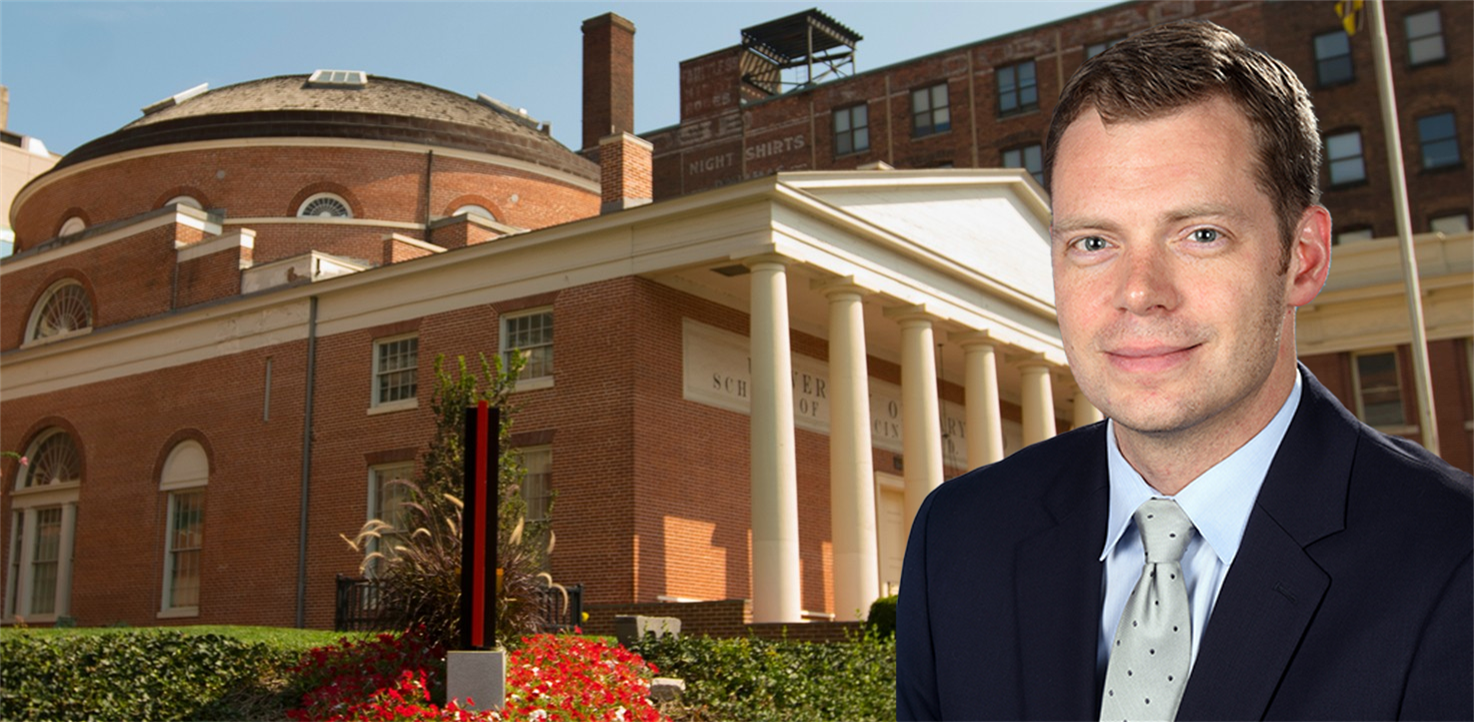 University of Maryland School of Medicine (UMSOM) Dean Mark T. Gladwin, MD announced today that Jason Rose, MD, MBA, has been named Associate Dean for Innovation and Physician Science Development at UMSOM. He will also serve as the Director of Faculty Entrepreneurship. The new positions are part of Dean Gladwin’s goal of strengthening the school’s physician-scientist pipeline and advancing a major effort to foster biomedical start-up companies that are based in academia.
University of Maryland School of Medicine (UMSOM) Dean Mark T. Gladwin, MD announced today that Jason Rose, MD, MBA, has been named Associate Dean for Innovation and Physician Science Development at UMSOM. He will also serve as the Director of Faculty Entrepreneurship. The new positions are part of Dean Gladwin’s goal of strengthening the school’s physician-scientist pipeline and advancing a major effort to foster biomedical start-up companies that are based in academia.
Dr. Rose was recruited from the University of Pittsburgh School of Medicine where he most recently served as the Associate Vice Chair of the Department of Medicine for Innovation and Commercialization and as the Director of Innovation and Entrepreneurship at the Division of Pulmonary, Allergy and Critical Care Medicine, as well as the Vascular Medicine Institute.
“Building a culture for accelerating innovation and entrepreneurship is one of our top strategic priorities for the UMSOM,” said Mark T. Gladwin, MD, Vice President for Medical Affairs, University of Maryland, Baltimore, and the John Z. and Akiko K. Bowers Distinguished Professor and Dean of the University of Maryland School of Medicine. “This new associate dean role will provide senior leadership to move our innovation and commercialization efforts forward. Dr. Rose is an amazing talent who will bring vision and leadership in this space.”
Dr. Rose has conducted extensive research into investigating novel therapies for carbon monoxide poisoning, responsible for more than 50,000 emergency room visits in the U.S. each year and one of the leading causes of poisoning deaths worldwide.
His findings have contributed to the development of a novel class of antidotal therapies involving a hemoglobin-like protein that is already present in the brain called neuroglobin. They created a mutant version that binds with a high affinity to carbon monoxide in the blood and can help clear the gas from the blood at a much faster rate. The promising early results have led to multiple patents and a start-up company, Globin Solutions, Inc., which he co-founded in 2017.
“Dr. Rose has worked to develop novel physician scientist training initiatives at the University of Pittsburgh, based on the unique approach he has taken to his own academic career, in which he incorporated an MBA and an FDA rotation into his clinical fellowship in pulmonary/ critical care,” said Christopher P. O’Donnell, PhD, Vice Dean for Research Development and Operations at the University of Maryland School of Medicine. “He is ideally suited to bring this innovative perspective to help develop new and diverse physician scientists and build a robust pipeline of commercial ventures.”
Dr. Rose currently serves as the President & CEO of Globin Solution. Under his leadership, Globin Solutions raised $5,500,000 in Series A funding in 2018 and was awarded a multi-PI Phase I/II Fast-Track STTR grant from the NIH in 2020. In support of his academic pursuits, he received a K08 award and a COVID-19 supplemental research grant from the NIH, a Parker B Francis Fellowship, a Battlefield Resuscitation for Immediate Stabilization of Combat Casualties from the Department of Defense, a Young Investigator award from the American Heart Association, and a Young Physician-Scientist award from the American Society of Clinical Investigation.
He co-founded a medical device company, Omnibus Medical Devices, LLC, with collaborators from Carnegie Mellon University in Biomedical Engineering and the Robotics Institute. His research, which focuses on inhalational toxicology, carbon monoxide poisoning, E-cigarette or Vaping Use-Associated Lung Injury (EVALI), respiratory failure, and machine learning in critical care medicine, has been published in high-impact scientific journals including Science Translational Medicine, Lancet Respiratory Medicine, Journal of Biological Chemistry, and the American Journal of Respiratory and Critical Care Medicine.
“I am looking forward to this opportunity to help expand the innovation ecosystem at UMSOM,” said Dr. Rose. “I hope to build on the earlier successes already established by UMSOM and construct a larger program to help faculty members commercialize their research efforts.”
This will include optimizing conflict of interest policies, promoting entrepreneurship and innovative science amongst the faculty, interfacing with the Maryland BioPark and the University of Maryland Medical System, and furthering commercialization focused funding strategies. Dr. Rose will seek to engage alumni and community stakeholders for advisement and partnership with entrepreneurs.
Dr. Rose earned his bachelor’s in Biomedical Engineering from the University of Michigan in 2006 and went on to attend medical school at Wayne State University. He completed residency in Internal Medicine at Duke University Medical Center in 2013 before coming to the University of Pittsburgh in 2013 for his clinical and research fellowship training in Pulmonary, Allergy and Critical Care Medicine (PACCM). He joined the faculty of the University of Pittsburgh School of Medicine in 2016 and was recently promoted to Associate Professor of Medicine and Bioengineering. Dr. Rose obtained his MBA from the Tepper School of Business at Carnegie Mellon University in 2017 with a focus on finance and entrepreneurship. He regularly rounds in medical intensive care unit with a clinical focus on mechanical ventilation, medical toxicology, and telemedicine in critical care.
Dr. Rose took on multiple leadership roles in developing innovation and commercialization opportunities for physician-scientists throughout while at the University of Pittsburgh School of Medicine. As Associate Vice Chair of Medicine, Dr. Rose partnered with UPMC Enterprises (the Investment Arm of UPMC health system) and the University of Pittsburgh to enhance innovative research and the commercialization of projects within the Department. He worked with Divisional leaders and Department faculty to connect investigators with the UPMC Enterprises Translational Sciences Portfolio and leverage their expertise and financial resources for commercialization of critical biomedical discoveries. As an intensivist during the initial phases of the COVID-19 pandemic, Dr. Rose served as Interim Director of Alternative Resourcing, assisting in efforts to explore innovative solutions to potential shortfalls in PPE and critical medical devices.
Dr. Rose is involved in multiple international academic medical organizations. He is active as a member of the Drug/Device Discovery and Development Committee of the American Thoracic Society (ATS) that fosters the bridge between leaders in respiratory therapeutics, academia, and the life science industry. He also has served on multiple Early Career Committees in both the ATS and American Heart Association to enhance the development and professional opportunities of early-stage physician-scientists.
About University of Maryland School of Medicine:
Now in its third century, the University of Maryland School of Medicine was chartered in 1807 as the first public medical school in the United States. It continues today as one of the fastest growing, top-tier biomedical research enterprises in the world — with 46 academic departments, centers, institutes, and programs, and a faculty of more than 3,000 physicians, scientists, and allied health professionals, including members of the National Academy of Medicine and the National Academy of Sciences, and a distinguished two-time winner of the Albert E. Lasker Award in Medical Research. With an operating budget of more than $1.3 billion, the School of Medicine works closely in partnership with the University of Maryland Medical Center and Medical System to provide research-intensive, academic, and clinically based care for nearly 2 million patients each year. The School of Medicine has nearly $600 million in extramural funding, with most of its academic departments highly ranked among all medical schools in the nation in research funding. As one of the seven professional schools that make up the University of Maryland, Baltimore campus, the School of Medicine has a total population of nearly 9,000 faculty and staff, including 2,500 students, trainees, residents, and fellows. The combined School of Medicine and Medical System (“University of Maryland Medicine”) has an annual budget of over $6 billion and an economic impact of nearly $20 billion on the state and local community. The School of Medicine, which ranks as the 8th highest among public medical schools in research productivity (according to the Association of American Medical Colleges profile) is an innovator in translational medicine, with 606 active patents and 52 start-up companies. In the latest U.S. News & World Report ranking of the Best Medical Schools, published in 2021, the UM School of Medicine is ranked #9 among the 92 public medical schools in the U.S., and in the top 15 percent (#27) of all 192 public and private U.S. medical schools. The School of Medicine works locally, nationally, and globally, with research and treatment facilities in 36 countries around the world.
About Jason J. Rose, MD, MBA:
Dr. Rose completed a BSE in Biomedical Engineering from the University of Michigan in 2006 and went on to attend medical school at Wayne State University. He completed residency in Internal Medicine at Duke University Medical Center in 2013 before coming to the University of Pittsburgh in 2013 for his clinical and research fellowship training in Pulmonary, Allergy and Critical Care Medicine (PACCM). He joined the faculty of the University of Pittsburgh School of Medicine in 2016 and was recently promoted to Associate Professor of Medicine and Bioengineering. Dr. Rose obtained his MBA from the Tepper School of Business at Carnegie Mellon University in 2017 to pursue his entrepreneurial aspirations for drug development in the field of inhalational toxicology. He regularly rounds in medical intensive care unit with a clinical focus on mechanical ventilation, medical toxicology, and telemedicine in critical care.
His research work in carbon monoxide poisoning has contributed to the development of a novel class of antidotal therapies — leading to multiple patents and a spin-out company, Globin Solutions, Inc., which he co-founded in 2017. Dr. Rose currently serves as the President & CEO of Globin Solution. Under his leadership, Globin Solutions raised $5,500,000 in Series A funding in 2018 and was awarded a multi-PI Phase I/II Fast-Track STTR grant from the NIH in 2020. In support of his academic pursuits, he received a K08 award from the NIH, a Parker B Francis Fellowship, a Battlefield Resuscitation for Immediate Stabilization of Combat Casualties from the Department of Defense, a Young Investigator award from the American Heart Association, and a Young Physician-Scientist award from the American Society of Clinical Investigation.
Dr. Rose took on multiple leadership roles in developing innovation and commercialization opportunities for physician-scientists throughout while at the University of Pittsburgh School of Medicine. As Associate Vice Chair of Medicine, Dr. Rose partnered with UPMC Enterprises (the Investment Arm of UPMC health system) and the University of Pittsburgh to enhance innovative research and the commercialization of projects within the Department. He worked with Divisional leaders and Department faculty to connect investigators with the UPMC Enterprises Translational Sciences Portfolio and leverage their expertise and financial resources for commercialization of critical biomedical discoveries. During the COVID-19 pandemic, Dr. Rose served as Interim Director of Alternative Resourcing, assisting in Department efforts to explore innovative solutions to potential shortfalls in PPE and critical medical devices.
Dr. Rose is involved in multiple international academic medical organizations. He is active as a member of the Drug/Device Discovery and Development Committee of the American Thoracic Society (ATS) that fosters the bridge between leaders in respiratory therapeutics, academia, and the device industry. He also has served on multiple Early Career Committees in both the ATS and American Heart Association to enhance the development and professional opportunities of early-stage physician-scientists.
Source:
News: https://www.medschool.umaryland.edu/news/2022/Dr-Jason-Rose-Appointed-Associate-Dean-for-Innovation-and-Physician-Science-Development.html
Jason J. Rose, MD, MBA: https://www.medschool.umaryland.edu/profiles/Rose-Jason/




